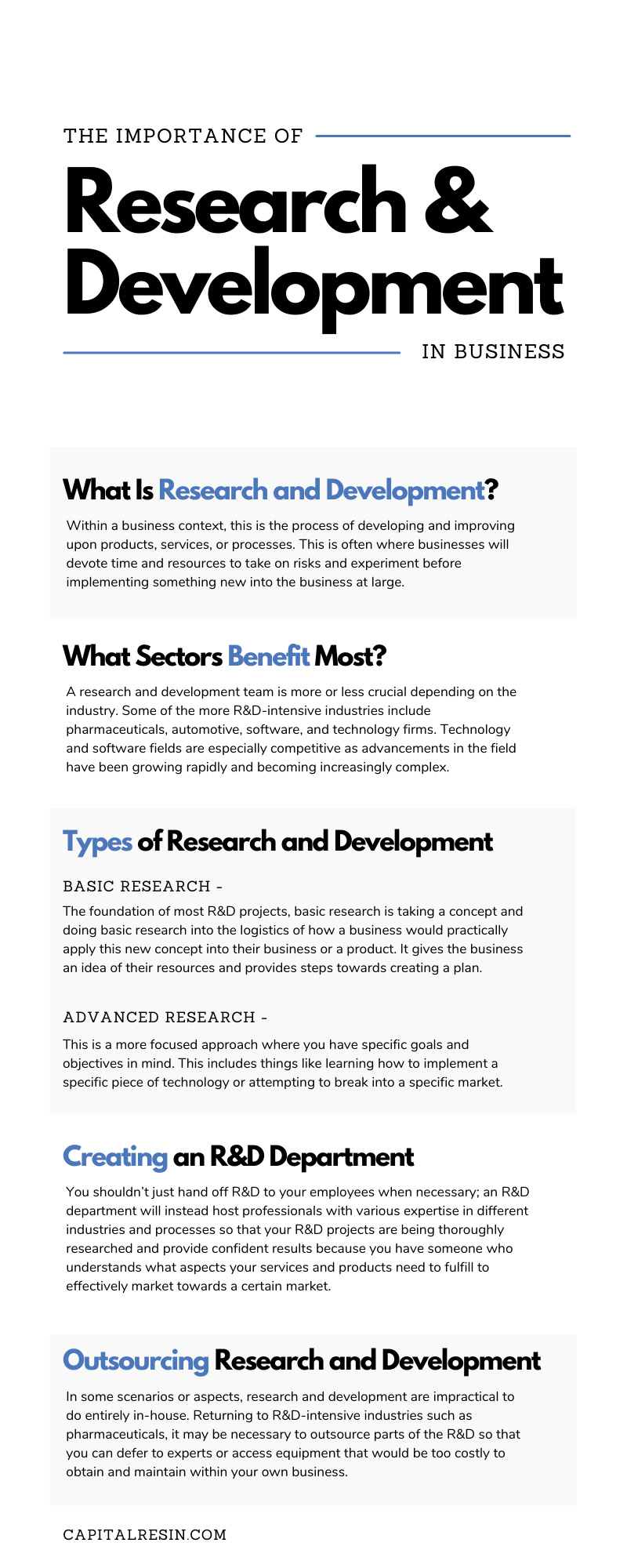In order to fully understand the importance of research and development in business, it helps to clearly define what R&D is and its role in the grand scheme of keeping your business competitive and thriving within its industry. So, let’s talk about what research and development entails and how it can be used most effectively within your business.
What Is Research and Development?
Within a business context, this is the process of developing and improving upon products, services, or processes. This is often where businesses will devote time and resources to take on risks and experiment before implementing something new into the business at large. It’s a chance for your business to address uncertainties and figure out how to take an idea and develop it into something practical and feasible to achieve.
However, taking these risks and experimenting is well worth the effort. As it can help you refine your business practices to become more efficient and develop higher quality products, as well as innovate new products that will keep your business competitive with other businesses and help you stand out with something unique to offer. A business without dedicated research and development will quickly become stagnant and antiquated.
What Sectors Benefit Most?
A research and development team is more or less crucial depending on the industry. Some of the more R&D-intensive industries include pharmaceuticals, automotive, software, and technology firms. Technology and software fields are especially competitive as advancements in the field have been growing rapidly and becoming increasingly complex. You need only look at brands such as Apple to see the importance of research and development in business and how creative design and innovation can launch a business to the forefront of an industry.
For middlemen like general stores that simply receive and sell the products of other brands, R&D may come down more towards advertising and drawing people to your store or making a product you sell more appealing to customers.
Types of Research and Development
There are a few different ways research and development can be handled, depending on the goal or the research in question. First, let’s look at the two main types of research and development that apply to most projects.
- Basic Research – The foundation of most R&D projects, basic research is taking a concept and doing basic research into the logistics of how a business would practically apply this new concept into their business or a product. It gives the business an idea of their resources and provides steps towards creating a plan.
- Advanced Research – This is a more focused approach where you have specific goals and objectives in mind. This includes things like learning how to implement a specific piece of technology or attempting to break into a specific market.
When doing research and development for a product or service, an added aspect of research includes getting a handle on understanding the market and the consumer demands. The demands of the market and needs of potential users will drive the direction of your R&D projection and outline what goals your new or improved product will need to meet.
If an existing product is no longer profitable or no longer holds any value to your business or customers, then you should tinker with it in research and development to figure out if the product can be improved or updated to keep up with modern technology and trends. Alternatively, you may want to revisit products to see if you can change the process to be more efficient or cheaper without compromising the quality of your products.
Creating an R&D Department
We’ve mentioned dedicated R&D departments already, but you may not be convinced that you need to dedicate a department and employees towards experimentation and research. You shouldn’t just hand off R&D to your employees when necessary; an R&D department will instead host professionals with various expertise in different industries and processes so that your R&D projects are being thoroughly researched and provide confident results because you have someone who understands what aspects your services and products need to fulfill to effectively market towards a certain market.
You also don’t want to underestimate research and development, as whether you realize it or not, the future growth of your business will heavily rely upon effective R&D keeping up with modern trends and other developments. This is best achieved by devoting resources and experts to an R&D department.
Outsourcing Research and Development
In some scenarios or aspects, research and development are impractical to do entirely in-house. Returning to R&D-intensive industries such as pharmaceuticals, it may be necessary to outsource parts of the R&D so that you can defer to experts or access equipment that would be too costly to obtain and maintain within your own business. In regards to pharmaceuticals, they made need a chemical engineering service to get their hands on research and components needed to develop or improve upon medication or, as is more relevant to the times, a vaccine. This toll manufacturing will ensure they have an ample supply of the chemicals they need for experimentation and the ability to specialize chemicals to suit their specific needs and goals.
In conclusion, research and development go hand-in-hand with economic growth and the prosperity of a company, no matter how big or small that business may be. This means it’s of interest to the wider interests of the country and the government, and thus should be stressed within your own business if you want to be able to take part in the prosperity of an innovative and cutting-edge market. Furthermore, if you want to be able to stand out from your competitors and become a house-hold brand, you need R&D so that you can develop creative new products or services that either address needs that not many other businesses can fulfill or become unique and stand above all the other products your own must compete with. Innovation is a word you may hear thrown around often, but it is vital as your main tool for looking towards the future and being prepared for it—otherwise you risk falling behind and fading into obscurity and stagnation.








